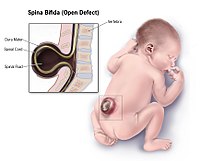
Photo from wikipedia
OBJECTIVES Our goal was to evaluate postoperative outcomes in patients with type A aortic dissection with preoperative neurological deficits independent of shock. METHODS Between 2002 and 2017, 150 of 1600… Click to show full abstract
OBJECTIVES Our goal was to evaluate postoperative outcomes in patients with type A aortic dissection with preoperative neurological deficits independent of shock. METHODS Between 2002 and 2017, 150 of 1600 patients, operated on for aortic dissection type A in 3 centres, presented with preoperative new onset neurological deficits. Postoperative outcomes were classified using a modified Rankin Scale (mRS) as 'no to moderate disability' (mRS 0-3) or as 'poor clinical outcome' (mRS 4-6). Clinical and radiographic data were analysed. RESULTS Ninety-three patients (62%) had no to moderate disability and 57 (38%) had a poor clinical outcome. The in-hospital mortality rate was 18% (28 patients). Patients with poor clinical outcomes were significantly older (P = 0.01) and had a significantly higher incidence of hypertension (P = 0.04), history of stroke (P = 0.03) and common carotid artery occlusion (left common carotid artery: P = 0.01; right common carotid artery: P < 0.01). One-third of all patients developed haemodynamic instability (P = 0.27). Cardiopulmonary bypass (P < 0.01) and cross-clamp (P = 0.03) times were significantly longer in patients with poor clinical outcomes. Age (odds ratio 1.041; P = 0.02) and history of stroke (odds ratio 2.651; P = 0.03) were predictive of poor clinical outcome; coma was not. Haemorrhagic transformation occurred in 7 patients without any independent predictors. CONCLUSIONS Most patients with preoperative neurological deficit have no to moderate disability postoperatively but commonly develop preoperative haemodynamic instability. This study suggests that an immediate surgical approach may be reasonable in patients with preoperative neurological deficit or coma.
Journal Title: Interactive cardiovascular and thoracic surgery
Year Published: 2020
Link to full text (if available)
Share on Social Media: Sign Up to like & get
recommendations!